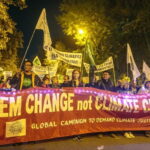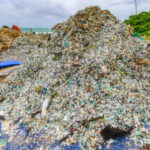ROBERTSPORT, Liberia — The sun was scorching hot in the town of Robertsport as James Dayougar shook debris from his nets, which he’d just returned from fishing with moments earlier. His eyes looked bloated, the nets disheveled. With just a few fish in his canoe, James’s day at sea had been a rough one. He sat down by his canoe and folded his arms to speak with Mongabay. “Whenever they pass … it is difficult to get fish from that entire area,” he said, referring to the industrial trawlers that regularly intrude on fishing grounds within 6 nautical miles (11 kilometers) of shore that are supposed to be reserved for artisanal fishers like himself. Now the government of Liberia plans to expand industrial bottom trawling in the country, authorizing a new fishery for high-value shrimp worth $80 per kilogram ($36 per pound). Dayougar’s statement expresses an age-old scuffle between artisanal fishers and industrial trawlers in these waters, one that many fishers here fear is about to get worse. Bottom trawling is a widespread fishing technique in which vessels drag weighted nets and rigid gear along the seabed, scooping up everything in their path. Conservationists say this causes long-term damage to seabed habitats and ecosystem functions, and catches sea life indiscriminately. The Liberian government’s decision to open a shrimp trawl fishery was informed by data collected during experimental shrimp fishing in 2021 and 2022 that culminated in the development of a draft shrimp fisheries management plan. According to the National Fisheries…This article was originally published on Mongabay
Search
Recent Research
Want your Blog Article featured on our website?
Research
Featured News
How to Make Your Home More Energy-Efficient in 2026
A practical, future-ready guide for lower bills and a smaller footprint Rising energy prices and
Sustainable Break Rooms: Greening the Office Pantry
Photo by Rodeo Project Management Software on Unsplash A break room may seem like a
Solar-powered AI streetlights to fund coastal highway construction
Nigeria’s long delayed Lagos-Calabar Coastal Highway is set to be rescued by thousands of AI-driven,
Big Data Analytics Enhances Renewable Energy sector
The sun doesn’t send bills, but energy companies using renewable energy do. And to keep
From COP30 to Sri Lanka, indigenous voices shape climate & food sovereignty
COLOMBO — When Indigenous groups converged at the entrance of the U.N. Climate Change Conference
Another threat to reefs: Microplastic chemicals may harm coral reproduction
As the sliver of a new moon shines over Kāneʻohe Bay, Oʻahu, millions of tiny
A Practical Guide to Choosing the Right Organizer Bins Online
Choosing organizer bins sounds simple — until you start comparing sizes, materials, and specs online.
How Lagos traders struggle as styrofoam gradually disappears in markets
Traders have continued to count their losses about five months after the Lagos State Government




